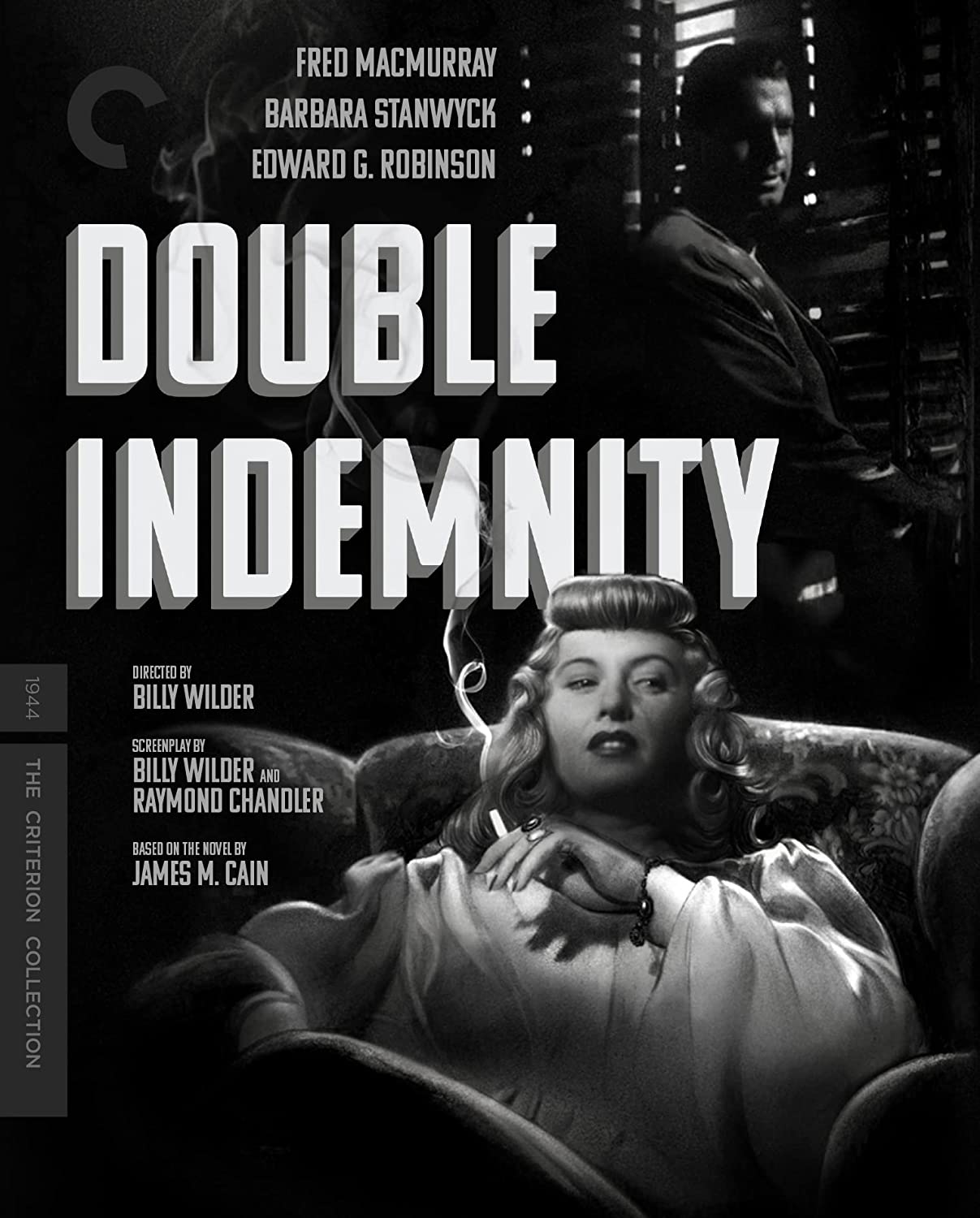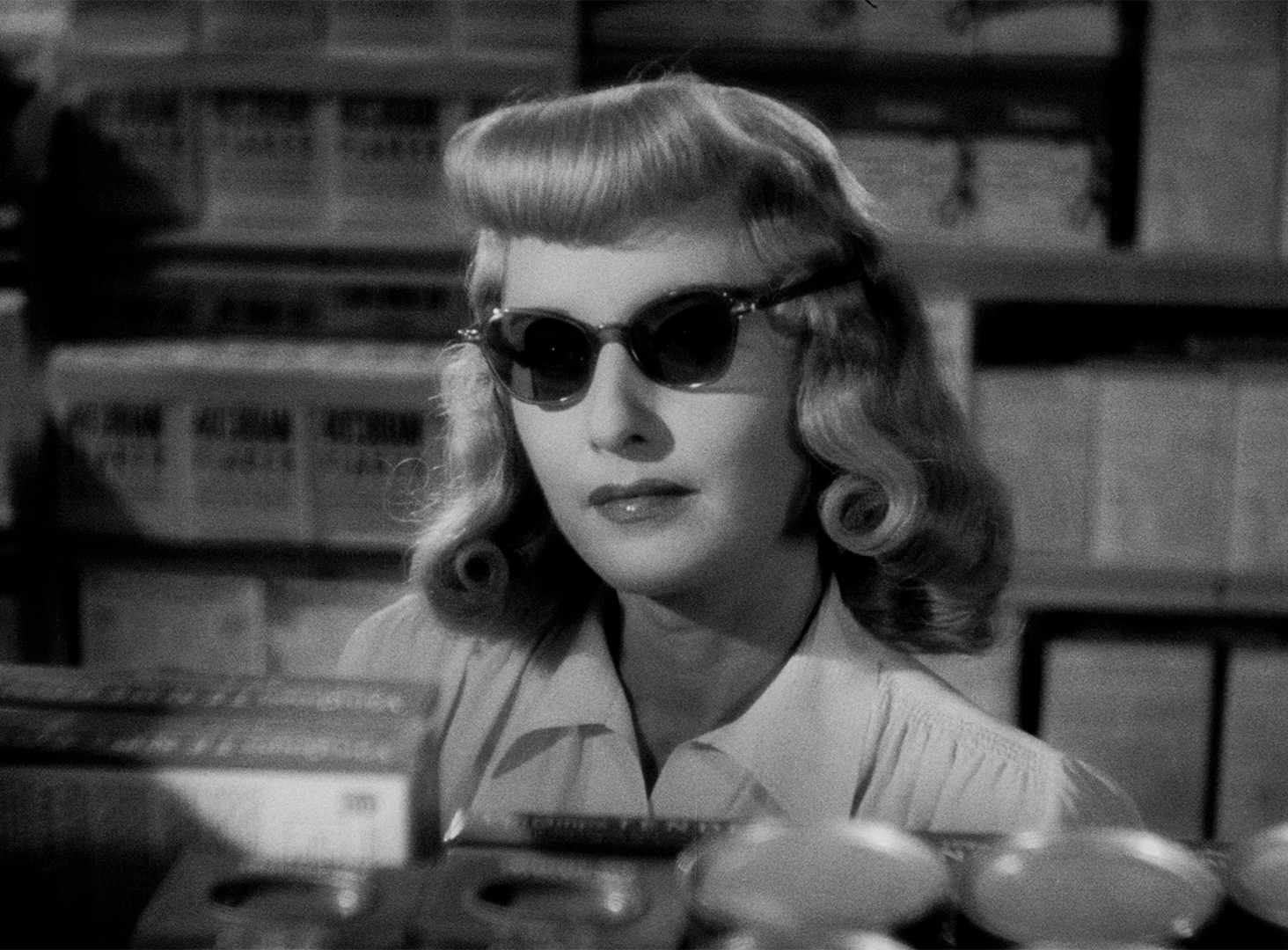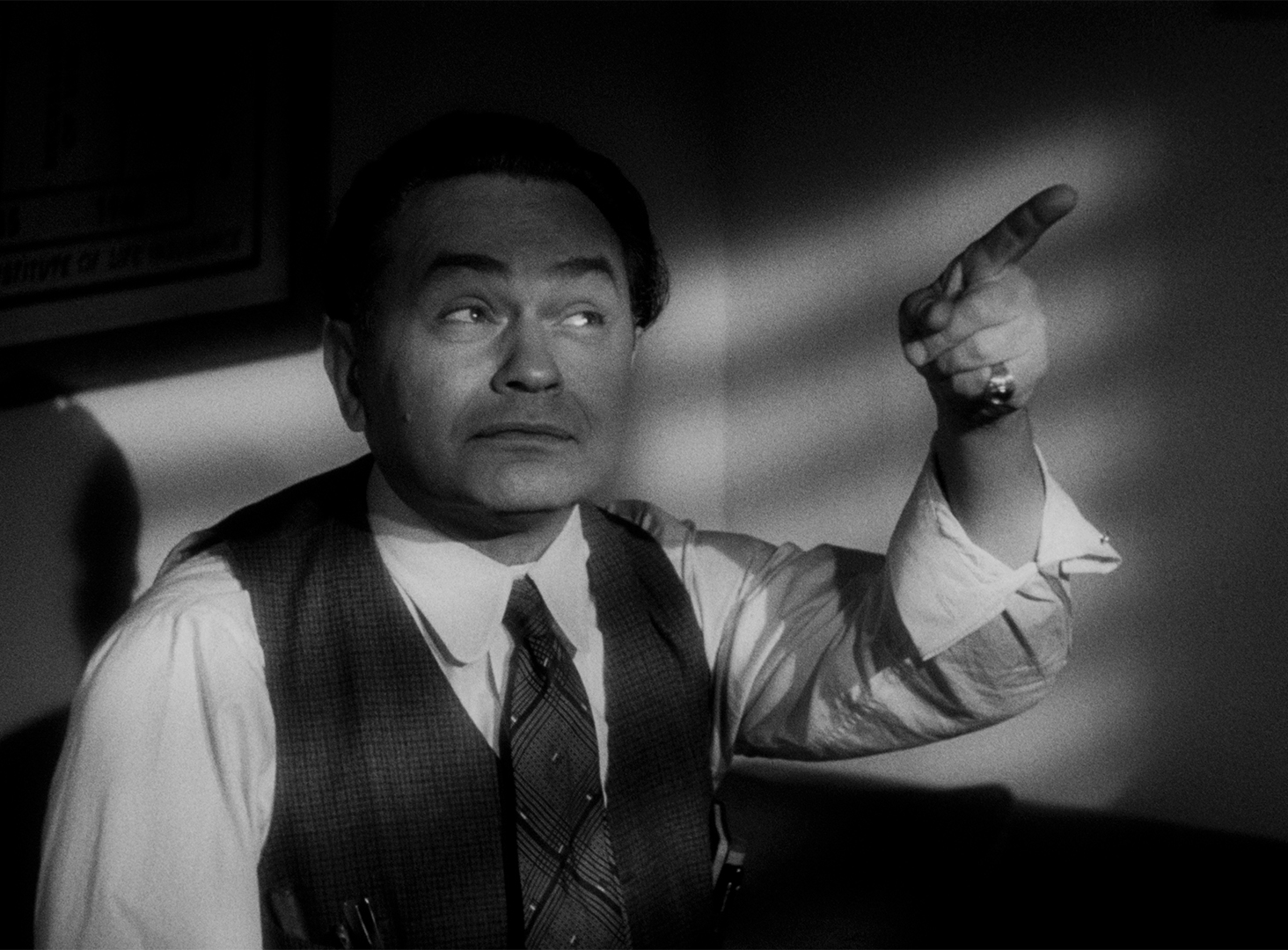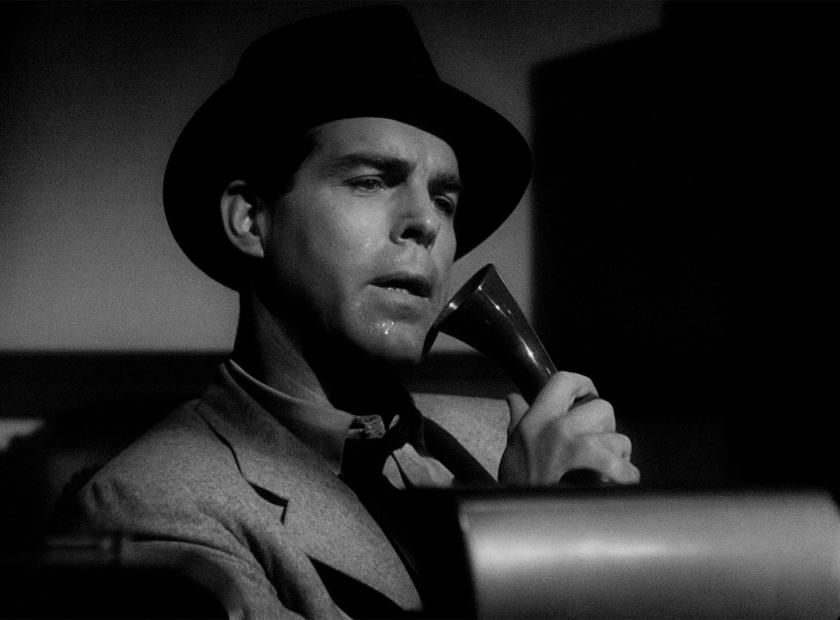His car skids through an LA stoplight, then Walter Neff (Fred MacMurray) enters his insurance office in the small hours, taking a lift as if to the scaffold, coat hanging like a cloak, a dark stain on his shoulder. From his upstairs office, the desks below look like a hellish pit, the lamps insectile.
Even with the light on, his face stays eaten by shadows at first. Fumbling for a cigarette, he turns on a voice recorder to confess. “Yes, I killed him. For money. And for a woman. I didn’t get the money. And I didn’t get the woman. Pretty, ain’t it?”
 Phyllis Dietrichson (Barbara Stanwyck, pictured below) is the woman, unhappily married in a sunlit suburban home in the hills. She makes her entrance wearing only a towel, cueing Olympic flirting (“There’s a speed limit in this state.” “How fast was I going?” “I’d say about 90…”). Turning up next as a sweater girl, her lips reach hungrily, Walter needing no second invitation. The insurance she wants on a husband she’d prefer dead also barely detains the conscience of a man who wants to beat his own system, shooting for the jackpot of double indemnity – a twofold pay-out for rare accidents. The unlikeable Mr Dietrichson signs his own death warrant when Walter duplicitously hands him insurance papers. Walter’s only worry is his friend and boss, Keyes (Edward G Robinson, pictured bottom), who can’t be fooled…
Phyllis Dietrichson (Barbara Stanwyck, pictured below) is the woman, unhappily married in a sunlit suburban home in the hills. She makes her entrance wearing only a towel, cueing Olympic flirting (“There’s a speed limit in this state.” “How fast was I going?” “I’d say about 90…”). Turning up next as a sweater girl, her lips reach hungrily, Walter needing no second invitation. The insurance she wants on a husband she’d prefer dead also barely detains the conscience of a man who wants to beat his own system, shooting for the jackpot of double indemnity – a twofold pay-out for rare accidents. The unlikeable Mr Dietrichson signs his own death warrant when Walter duplicitously hands him insurance papers. Walter’s only worry is his friend and boss, Keyes (Edward G Robinson, pictured bottom), who can’t be fooled…
Billy Wilder’s Double Indemnity didn’t invent film noir, but defined it early, nailing the post-war American taste for more realistic, adult films in 1944, and the tropes of voiceover, flashbacks, femme fatales and crepuscular lives, here limned by cinematographer John Seitz, who had “guts”, Wilder later said, plunging some scenes into darkest night.
 Wilder’s third film as writer-director was his first of many classics (Some Like It Hot tops the list), after fine script work going back to Berlin in the 1920s. Its sensibility combines his scrappy, brilliantly crafted cynicism and iconoclastic contempt for studio constraint, James M Cain’s adapted novella, unfilmable on its 1936 publication, and co-writer Raymond Chandler, whose hardboiled wit sparks the dialogue and nails the voiceover. Cain turns the scheming killers whom Chandler’s trench coat knight errant Philip Marlowe would hunt into protagonists, in a perfect triangle of complementary talent.
Wilder’s third film as writer-director was his first of many classics (Some Like It Hot tops the list), after fine script work going back to Berlin in the 1920s. Its sensibility combines his scrappy, brilliantly crafted cynicism and iconoclastic contempt for studio constraint, James M Cain’s adapted novella, unfilmable on its 1936 publication, and co-writer Raymond Chandler, whose hardboiled wit sparks the dialogue and nails the voiceover. Cain turns the scheming killers whom Chandler’s trench coat knight errant Philip Marlowe would hunt into protagonists, in a perfect triangle of complementary talent.
Then there’s nice Fred MacMurray, a romantic lead and later avuncular Disney regular, with his apple pie open face. Here, he’s a salesman, mouth and eyes hard and on the make, whose criminal acts cage him into watchful insouciance. Stanwyck, then the top female star, is cheapened with a blonde wig, and lit seductively, pointing up her chest, Wilder playing matador games with the censors. But when they plot in a supermarket between cans of baby food and beans, her head turns after Walter in cool assessment. We experience her husband’s murder, just offscreen, in her set look of satisfaction. These aren’t desperate lovers. Lust just greases the greed.
The tape-reel spins on as Walter sets this down for Robinson’s Keyes, who meanwhile rattles out Chandler’s patter at breakneck speed. After an unlikely sentimental weakening in a film of still bracing cold-bloodedness, it’s Robinson who provides a last, perfect emotional charge, ruefully warm as Walter unravels.
Criterion’s two-disc Blu-ray’s extras include film scholar Noah Eisenberg on Austro-Hungarian Jewish Wilder’s colourful career in Vienna and Berlin as a jazz PR, taxi-dancer, journalist and screenwriter, prone from birth to Berlin’s US-loving Amerikanismus craze when his mum named him after Buffalo Bill. Her fate was unknown as he filmed Double Indemnity, but she and his grandmother were murdered in the camps.
Film scholars Eddie Muller and Imogen Sara Smith make the case for Double Indemnity as the ultimate noir, and recall Chandler and Wilder’s mutual loathing during their odd couple months writing it. William Friedkin and James Ellroy consider all this in 2006 doc Shadows of Suspense, and there are 1945 and 1950 radio adaptations of Double Indemnity with Stanwyck and MacMurray. Best, the second disc has the three-hour 1992 Arena doc Billy, How Did You Do It?, in which The Tin Drum’s director Volker Schlöndorff lets self-described “Middle-European asshole” Wilder hold forth aged 85.















Add comment